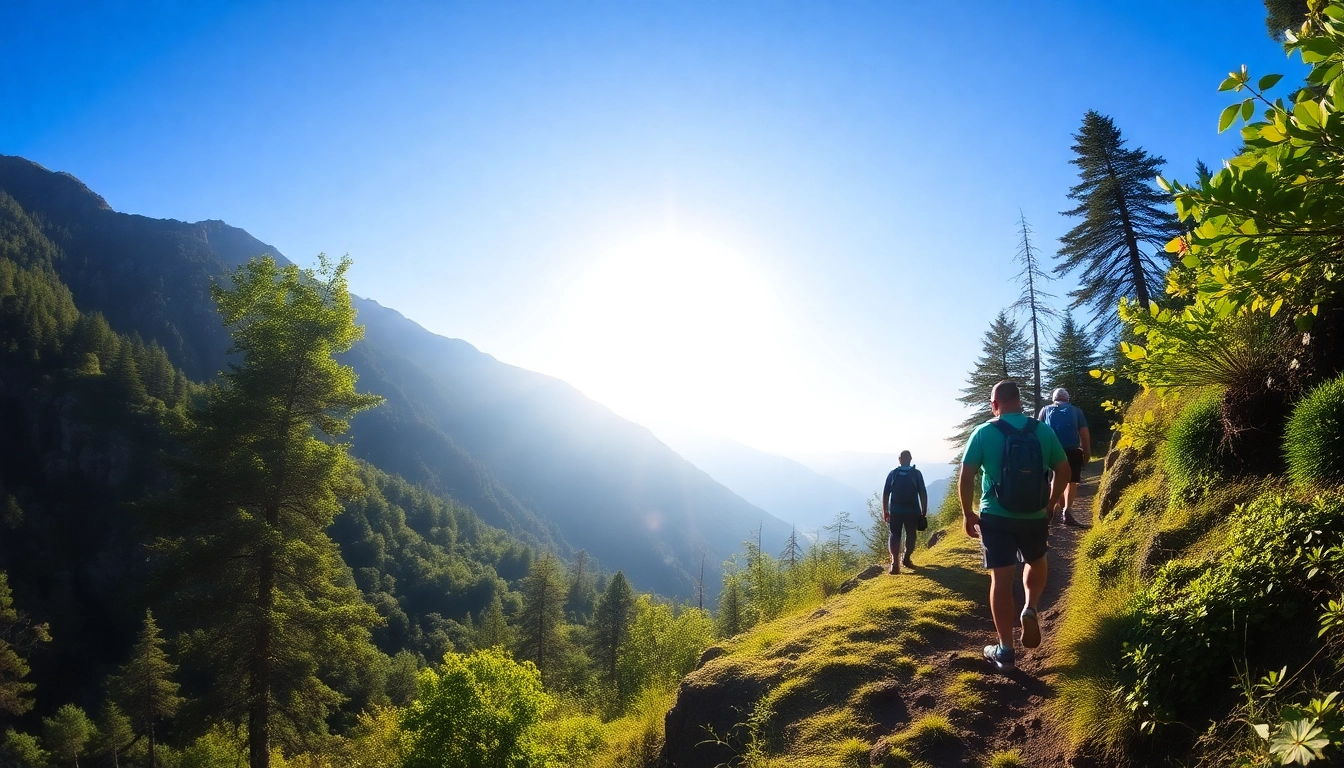
Understanding What a Guided Hike Entails
Definition and Key Features of Guided Hiking Tours
A guided hike is an organized outdoor activity where participants traverse a trail with the support and leadership of an experienced guide. Unlike autonomous hikes, guided tours provide structure, safety, and educational opportunities that enhance the overall experience. These guides are typically well-versed in local terrain, flora, fauna, and cultural history, enriching the trek with valuable insights. Their primary role is to ensure the safety of all participants, navigate complex or tricky sections of the trail, and foster an environment that is both enjoyable and educational.
Key features of guided hiking tours include small group sizes to maintain intimacy and personalized attention, expert guidance with extensive local knowledge, and logistical arrangements such as permits, meals, and transportation often covered by the tour provider. This comprehensive approach allows hikers—especially those unfamiliar with local trails or new to hiking—to focus on their experience without concerns about navigation or safety.
Benefits of Joining a Guided Hike Over Independent Trekking
Choosing a guided hike offers numerous advantages over independent trekking, especially for beginners or those seeking a stress-free adventure. Firstly, safety is significantly enhanced. Guided hikes ensure that participants are led by professionals who are trained to handle emergencies, navigate difficult routes, and manage group health issues. guided hike providers also often include safety equipment, first aid kits, and emergency procedures as part of their package.
Secondly, guided hikes improve the learning experience. Guides share insights about local history, geology, wildlife, and cultural stories, making the trek both informative and memorable. This educational aspect enriches the connection to the environment and helps foster a deeper appreciation of the destination. Additionally, guided tours tend to be more convenient—planned logistics, accommodations, and meals are often included, allowing hikers to fully immerse in the adventure without worries about planning every detail.
Moreover, guided hikes foster social interaction, as small groups encourage camaraderie, shared stories, and networking among participants. This social element can transform a solitary outdoor activity into a memorable group experience. For travelers looking for a hassle-free, enriching, and safe adventure, guided hikes present an optimal solution.
Common Types of Guided Hikes Available in Lombok
Lombok, Indonesia, offers a diverse array of guided hikes tailored to various interests, fitness levels, and durations. Some of the most popular types include:
- Mountain Summits: Guided ascents of the majestic Rinjani Volcano, Indonesia’s second-highest volcano, are among the most sought-after activities. Experts lead multi-day treks, providing assistance with acclimatization and safety. These trips often include camping overnight near the crater and exploring the lush surrounding landscapes.
- Forest & Jungle Treks: Lombok’s dense rainforests and lush valleys provide opportunities for guided nature walks. These hikes focus on biodiversity, local ecosystems, and cultural sites hidden within the forests.
- Cultural & Heritage Trails: Guided hikes that incorporate visits to traditional Sasak villages, rice terraces, and historical sites. These tours combine outdoor adventure with cultural immersion.
- Coastal & Beach Walks: Explore Lombok’s pristine beaches and coastal cliffs with guided tours that highlight marine ecosystems, tide pools, and scenic vistas.
Each type of guided hike caters to different interests—whether you’re seeking adventure, cultural insight, or nature appreciation—and can be customized for different fitness levels, from beginner to seasoned trekker.
Planning Your Perfect Guided Hike in Lombok
Selecting the Right Trail for Your Fitness Level
Effective planning begins with understanding your fitness and experience levels. Lombok’s many trails vary from easy walks to strenuous mountain ascents. Assess your physical fitness and choose a trail accordingly. For beginners or those seeking a leisurely experience, options like village walks or coastal hikes are ideal. These typically involve flatter terrain and shorter durations.
Conversely, seasoned trekkers aiming for adventure can opt for Rinjani’s multi-day ascents, which demand stamina and acclimatization. Detailed trail descriptions, elevation gains, and required gear should be reviewed before booking. Expert guides can assist in matching you with an appropriate trail, ensuring safety, enjoyment, and personal achievement.
What to Pack and Prepare for a Guided Mountain Hike
Preparation is key to a successful guided hike. Essential packing items include durable trekking shoes, lightweight and moisture-wicking clothing, sun protection (hat, sunglasses, sunscreen), a refillable water bottle, snacks, and a small first aid kit. If the hike spans multiple days, packing lightweight sleeping gear, a tent (if camping), and appropriate clothing for different weather conditions is necessary.
Additional preparations include physical training—such as cardio and strength exercises—meditation on altitude approaches, and studying the trail map or itinerary provided by your guide. Communicate dietary restrictions or medical conditions beforehand to ensure necessary accommodations are made.
Best Seasons and Weather Conditions in Lombok for Guided Treks
Timing your hike is crucial for safety and enjoyment. Lombok has a tropical climate with distinct wet and dry seasons. The dry season, from May to September, offers the most favorable weather, characterized by clear skies, lower humidity, and minimal rainfall—ideal for mountain and forest treks.
The wet season, from October to April, can bring unpredictable weather, with heavy rains, muddy trails, and potential safety concerns. However, fewer tourists and lush landscapes can compensate for some of these challenges if proper precautions are taken. Always check current weather forecasts and consult with local guides for the best timing suited to your preferred trail and activity level.
Choosing a Reputable Guided Hike Provider
What to Look for in an Experienced Guide and Tour Company
Selecting a reputable guided hike provider involves scrutinizing their credentials, experience, and customer reviews. A certified guide should have local knowledge, appropriate certifications (such as wilderness first aid), and a track record of safety and professionalism. Research the company’s years of operation, guides’ expertise, and commitment to responsible tourism.
Additionally, consider the inclusivity of services—do they provide necessary gear, permits, transportation, and accommodations? A transparent company ensures clear communication about itineraries, safety protocols, and weather contingencies.
Assessing Safety Measures and Group Sizes
Safety is paramount in guided trekking. Verify that the provider adheres to international safety standards, maintains well-maintained equipment, and has emergency response plans. Small group sizes—typically 6-12 participants—allow for better supervision, individual attention, and a more personalized experience.
Inquire about evacuation procedures, communication devices, and availability of medical supplies. Responsible companies prioritize group safety and actively monitor trail conditions, weather, and participant health throughout the trek.
Reviews and Testimonials from Past Participants
Reading feedback from previous hikers offers insights into the company’s reliability and guide quality. Look for reviews that mention safety, guide professionalism, trail authenticity, and overall experience satisfaction. Platforms like TripAdvisor, Google Reviews, or the provider’s official website can serve as valuable resources.
Positive testimonials often highlight personalized attention, local cultural insights, and memorable experiences, reinforcing the company’s credibility and suitability for your adventure.
Enhancing Your Hiking Experience
Tips for Engaging with Your Guide and Learning About Local Culture
Active engagement with guides enriches your trek profoundly. Ask questions about local traditions, beliefs, and ecological practices. Take time to listen to stories and explanations about flora, fauna, and historical sites. Respect local customs and contribute positively to the community by supporting local businesses and cultural initiatives.
Photography and Sightseeing Opportunities During the Hike
Lombok’s diverse landscapes provide stunning photo opportunities—from panoramic mountain vistas to lush jungles and crystal-clear beaches. Carry a camera or smartphone with ample storage and consider bringing additional lenses for varied shots. Always prioritize safety—stop at designated viewpoints and follow guidance instructions to ensure a safe photography experience.
Guides can help identify the best spots and optimal times of day for capturing images, transforming your hike into a memorable visual journey.
Post-Hike Recommendations for Continuing Adventure in Lombok
After completing your guided hike, extend your adventure by exploring Lombok’s vibrant culture, charming villages, and pristine beaches. Consider additional activities such as snorkeling, surfing, or visiting waterfalls like Sendang Gile and Tiu Kelep. Engage with local artisans, indulge in authentic Sasak cuisine, and relax at eco-resorts or boutique accommodations that promote sustainable tourism.
This holistic approach ensures your trip remains enriching, memorable, and responsible, fostering a deep connection with Lombok’s natural and cultural heritage.
Measuring Success and Getting the Most Out of Your Guided Hike
Tracking Your Fitness and Trail Achievements
Document your progress through GPS devices, fitness apps, or personal journals. Recording elevation gains, distances covered, and personal milestones provides motivation and helps evaluate your fitness improvements over time. Many guided tours also offer official certificates or badges of achievement, serving as tangible souvenirs of your adventure.
Understanding Environmental Impact and Responsible Trekking
Respect for the environment is essential in sustained outdoor activities. Follow Leave No Trace principles: dispose of waste properly, stay on designated trails, minimize campfire impact, and avoid disturbing wildlife. Support eco-friendly operators who implement conservation practices and contribute to local sustainability projects.
Sharing Your Experience and Inspiring Others to Trek
Share your journey through social media, blogs, or personal stories to inspire others to explore Lombok responsibly. Highlight the importance of guided hikes for safety, education, and cultural exchange. Your stories can motivate more travelers to appreciate and conserve the natural beauty of Lombok through responsible trekking and tourism.




